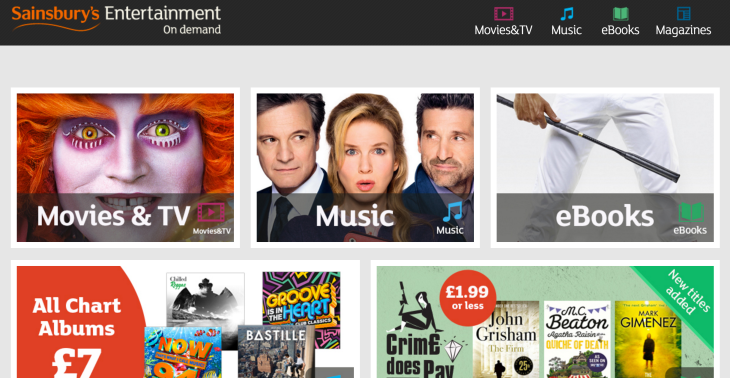Once again, a big retailer in the UK is pulling away from its ambitions to move into digital media. Supermarket giant Sainsbury’s is exiting the digital entertainment business. As part of that process, it will be outsourcing its e-book operations to Kobo, the online bookseller and maker of e-readers, owned by Japan’s Rakuten.
The digital entertainment business, which is marketed as Sainsbury’s Entertainment on Demand, also includes music, movies and TV shows and magazines, alongside e-books. I’ve contacted a customer support rep at Sainsbury’s Entertainment who has also confirmed that everything will be “winding down across all platforms in the next few months.”
And now we have a statement from Sainbury’s PR:
“Following a commercial review we have taken the strategic decision to close the Sainsbury’s Entertainment service. We know many customers valued this service and we regret to disappoint them. We’re now contacting these customers to let them know what options are available to them, including e-book customers who can migrate their libraries across to a new platform.”
It’s now also posted a statement online.
For some parts of the businesses like music and digital magazines, you will be able to buy content until October 1, and you can listen to and download your music on Sainsbury’s apps until November 30. Movies and TV have been closed “with immediate effect.” And Kobo has confirmed to us the details of the e-book aspect of the deal:
Kobo says that existing customers who have purchased e-books from Sainsbury’s will be able to transfer these books to a Kobo library to continue reading and owning them. Those who were already customers will get notified by Sainsbury’s by October 25 with a unique code and instructions of what to do to continue accessing their existing libraries. Sainsbury’s will be completely discontinuing its service on December 1.
“We look forward to welcoming Sainsbury’s customers to read with Kobo. They will be able to cherish the books they currently have for years to come as well as add new ones with personalised recommendations and expert selections to suit each and every booklover,” said Michael Tamblyn, President and Chief Executive Officer, Rakuten Kobo, in a statement.
It’s a very ironic, and maybe unexpected, turn of events, considering that it was only in March of this year that Sainsbury’s picked up Nook’s customer base and business when Barnes & Noble exited the UK market.
Sainsbury’s, you might recall, first entered the e-book market back in 2012, when it purchased a 64% stake in e-book startup Anobii. Sainsbury’s bought those shares off HMV for a mere £1, as the entertainment retailer was slowly going bankrupt at the time (it eventually exited, heavily restructured).
But with a huge wave of competition, chiefly from Amazon in e-books — it controls 90% of the e-book market in this country. 90 percent! — but also the likes of Netflix and a number of other OTT and broadcaster-led streaming services where video is concerned, it’s hard for others kinds of retailers to get a look in.
And Kobo has been waiting in the wings as a consolidator. Others that have exited e-books and outsourced to Kobo include book retailer Waterstones in the UK, Flipkart in India, and Sainsbury’s big supermarket rival Tesco.
For Sainsbury’s part, the company has been looking for better margins in the retail sector, and recently acquired the Home Retail Group, owner of consumer electronics retailer Argos (who is a strong partner with eBay), for £1.4 billion. Sainsbury’s has also seen a struggle with sales growth and is caught in a stalemate over the cost savings of closing stores, the investment needed to open them and the ongoing heavy competition against other large supermarket chains like Tesco and Walmart’s ASDA. In that context, it seems that trying to support the online media sales business — while originally appearing to be a logical progression for Sainsbury’s — was a step too far.
